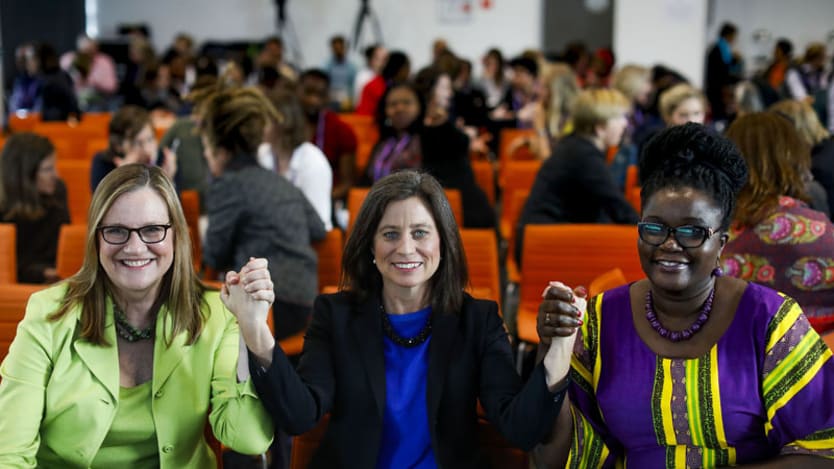
CANBERRA — Despite large investments seeking to improve women’s empowerment, gender gaps remain in women’s access to economic empowerment.
Without market demand for integration of government programs such as social protection, such programs are bound to fail, recent research has shown.
“No amount of gender analysis or clever gender transformation design will be scalable or sustainable, and it won’t get women out of poverty,” said Vicki Wilde, senior program officer with the Bill & Melinda Gates Foundation, referring to a study of $800 million worth of investments made by the foundation.
The findings of the research, which are yet to be released, were presented by Wilde at the Seeds of Change conference in Canberra, Australia, on April 4. It sparked discussion on what agricultural interventions can improve the lives of women and girls, and the role donors can play in supporting better solutions.
The Gates study
The study focused on inclusive agricultural transformation in Ethiopia, India, Nigeria, and Tanzania. Collating a range of data on the lives of men and women, it found that women were falling behind in spite of agriculture transformations.
“In these four countries there are gender gaps of up to 27 percentage point between men and women in their access to inputs and access to market opportunities,” Wilde said. “And even as the health and education of women and girls [are] improving, their economic lives continue to lag.”
Despite interventions, women continued to be restricted to lower scales of work resulting in large gender gaps in income.
“What these women want, and what they want for their children, is to get out of the back-breaking work of agriculture,” she explained. “Most poor women in the geographies we focus will focus on agriculture in the short to medium term due to the lack of good options.”
Other wage options were not yet emerging, with social norms restricting women’s mobility and imposing high entry barriers to lucrative opportunities. These were system failures combined with social norms that create “a terrible sandwich” that restrict economic improvements.
To produce a new strategy for women’s economic empowerment, the Gates Foundation looked back at their investments — $800 million invested in women and markets in programs aimed at women’s empowerment — which included 120 different business models and institutional partnerships that were trying to connect farmers to markets.
“We looked at outgrower schemes, we looked at farmer field schools, we looked at agrodealerships, we looked at poverty graduation programs, we looked at 120 models — this is what we do,” Wilde explained.
The findings were that women’s inclusion was rarely the norm.
As another part of the study, they looked at $6.4 billion in markets investments in sub-Saharan Africa and found that many were adjusting at the supply side only — for example, focusing on increasing yield without looking at market demand.
Less than 9 percent of investment included a focus on women’s assets, time or mobility constraints, and few programs could report results by gender, showing limited insights into how interventions affected women.
For Wilde and her team, these findings highlighted the importance of improving systems above and below women to create sustainable and transformative change.
A changing focus in gender
Wilde hoped that the findings of the research will help the agriculture team within the Gates Foundation focus its work on increasing women’s income, and its decision-making over the benefits of that income.
“They’re going to focus on women’s market inclusion with an emphasis on building or leveraging collective action through producer collective and digital platforms, increasing the profitability of women’s entrepreneurship and engaging agribusiness to solve for more inclusive and equitable return in their value chain,” Wilde said.
The work of researchers, she said, would be relied on to show donors such as the Gates Foundation what works and how to remove barriers to progress.
For future Gates-funded projects focusing on agriculture in development, Wilde explained to Devex that it will be important for applicants to be applying “sandwich approach” to projects, supporting both market and government-level interventions to support gender transformative work.
And importantly, thinking about who will need to be a part of projects to deliver these changes — including government, the private sector, and NGOs partners.
Response to the findings
Jayne Curnow, research program manager for social sciences with the Australian Center for International Agricultural Research, told Devex the findings presented by Wilde provide an important evidence base that will help shape gender programming.
“That data is not out there yet and we received a bit of a preview,” she said. In creating structural change, Curnow said it was important that gender was considered from the ground up in developing an understanding of gender-based challenges and solutions — something that is not always happening.
“It is what we suspected, and shows that now we need to stop talking and start listening. The reason we have got it so wrong is because we are not listening to the farmers. And by farmers I mean she, not he.”








